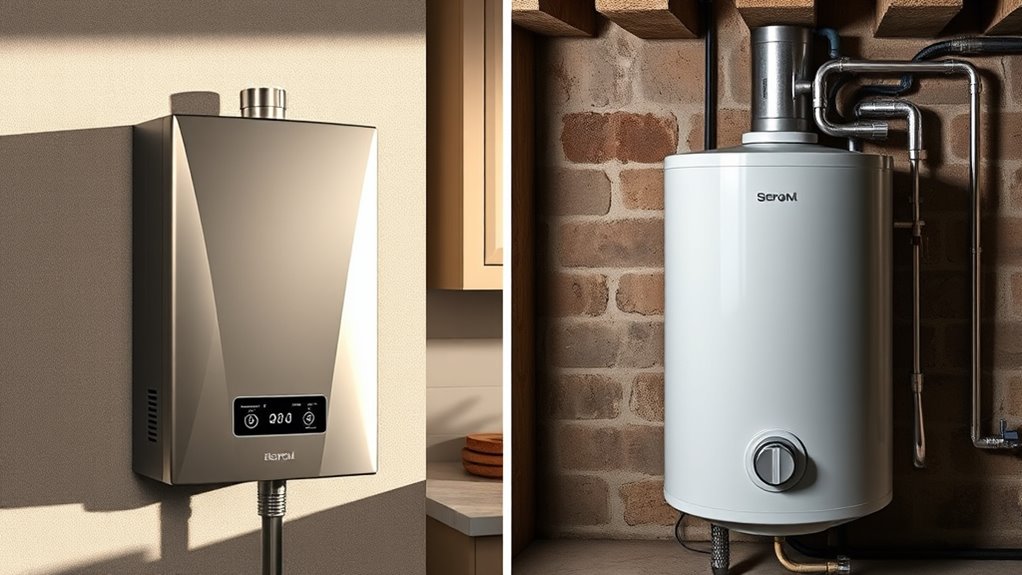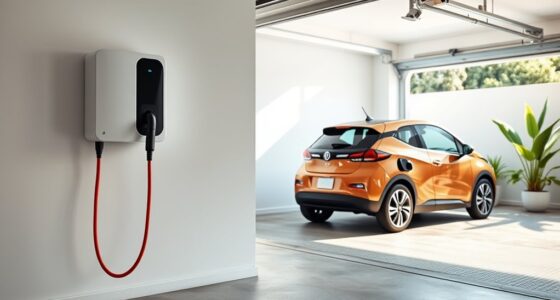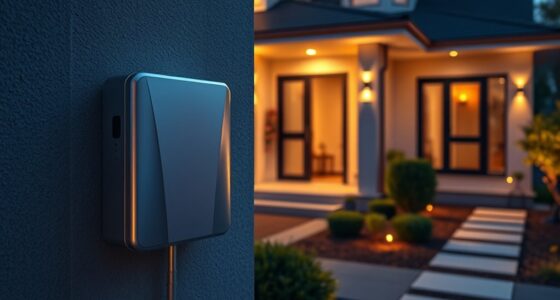Tankless water heaters provide on-demand hot water, saving space and reducing energy bills with their higher efficiency, but they may struggle to supply multiple faucets at once. Traditional tanks are cheaper upfront and easier to install but use more energy and occupy more space. If you want to maximize savings and space, a tankless system could be the better choice. To understand which suits your home best, discover the key differences that follow.
Key Takeaways
- Tankless heaters provide hot water on demand and save space, while traditional models store heated water and occupy more room.
- Tankless systems are more energy-efficient and cost-effective over time, despite higher initial costs.
- Traditional water heaters are easier and cheaper to install and repair, but less efficient and more prone to standby energy loss.
- Tankless units have flow rate limitations, which may be insufficient for large households with multiple simultaneous fixtures.
- Both systems require maintenance, but tankless models have fewer components and lower risk of leaks.

When choosing a water heater for your home, understanding the key differences between tankless and traditional models can help you make an informed decision. Tankless water heaters heat water only when you need it, providing a continuous supply without the need for a storage tank. This means you won’t run out of hot water during showers or while doing laundry, which is a significant advantage for busy households. They operate on an instantaneous heating principle, so hot water is generated on demand, making them highly efficient compared to traditional tank models.
In terms of energy efficiency, tankless heaters stand out, especially if your household uses less than 41 gallons of hot water daily. They can save up to 34% on energy bills because they avoid standby losses—the energy wasted in maintaining the temperature in a storage tank. Traditional water heaters, on the other hand, keep water heated constantly, even when you’re not using it, leading to higher energy consumption and costs over time. While tankless heaters have a higher upfront cost and can be more challenging to install, their longer lifespan—often surpassing traditional models—can justify the investment in the long run.
Space is another vital factor. Tankless systems are much more compact, fitting into small closets or even mounting on walls, freeing up valuable space in your home. Traditional heaters tend to be larger and require more room, which can be a concern if you have limited space. Installation of traditional units is generally simpler and less costly, but tankless systems might require modifications to your existing plumbing or electrical setup. Maintenance is also easier with tankless models since they have fewer components and are less prone to leaks, reducing the risk of water damage.
Flow rate limitations are worth considering. Tankless water heaters typically provide 2 to 5 gallons per minute, which can be enough for small households but may fall short when multiple fixtures are in use simultaneously. Large families often need multiple units or larger capacity models to meet their hot water demands. Additionally, while tankless systems are energy-efficient, they can be more complex to repair if issues arise, often requiring specialized technicians. Traditional heaters, although less efficient, are generally easier and cheaper to repair.
Environmental benefits add to the appeal of tankless heaters by reducing energy consumption and greenhouse gas emissions. They also help conserve water during leaks because they don’t store water in a tank. Moreover, the increasing adoption of merchant services and other modern technologies highlights the importance of reliable and efficient systems to support home and business operations. Ultimately, your choice depends on your household’s hot water needs, budget, and space constraints. While traditional models are more affordable initially, tankless heaters offer long-term savings, efficiency, and space-saving benefits that can make them a worthwhile investment.
Frequently Asked Questions
How Long Do Tankless Water Heaters Typically Last?
You’re probably wondering how long a tankless water heater lasts. Typically, they last between 15 to 20 years, with high-quality models sometimes exceeding 20 years. Regular maintenance, like yearly flushing and using water treatment, can prolong their lifespan. Factors such as water quality, usage, and the materials used in construction influence durability. Proper care ensures you get the most out of your investment and enjoy consistent hot water for years.
Are There Specific Home Sizes That Favor Tankless Models?
You’ll find that smaller homes with 1-2 residents benefit most from tankless models, thanks to their space-saving design and energy efficiency. Medium-sized households with 3-4 people can usually meet their hot water needs with a single tankless unit. Larger homes with 5 or more residents often require multiple units or traditional tanks to handle high demand. Consider your household size and usage patterns to choose the best system for your home.
Do Tankless Heaters Require Special Electrical Wiring?
You need to know that tankless heaters do require special electrical wiring. They typically demand a 220-240 volt circuit and can draw up to 100 amps, meaning your home’s electrical panel might need upgrades. You’ll likely need dedicated circuits, heavy-gauge wiring, and possibly a sub-panel to handle the load safely. Always consult an electrician to confirm your wiring meets code and can support the heater’s power requirements.
Can Existing Plumbing Be Easily Adapted for Tankless Systems?
You can adapt your existing plumbing for tankless systems, but it might not be straightforward. Most units need 3/4-inch water lines, so you may need to upgrade your current pipes. Confirm your water pressure is below 80 psi or install a pressure-reducing valve. Also, check if your venting and gas lines meet the new requirements. Modifications vary based on your home’s setup, so plan for possible additional work.
What Is the Impact of Water Hardness on Both Systems?
Imagine a river carrying minerals that settle like sediment, clogging a filter or a heater’s core. Water hardness acts similarly, causing mineral buildup inside both tankless and traditional water heaters. This scale insulates heating elements, reduces efficiency, and can lead to overheating or damage. Regular maintenance, softeners, and water treatment act like cleaning the river, keeping your system flowing smoothly and prolonging its life.
Conclusion
Choosing between a tankless and traditional water heater is like selecting the right tool for a job—you’ll want to match it to your needs. Tankless units offer endless hot water and save space, while traditional models are often more budget-friendly upfront. Consider your household’s hot water habits and budget. Ultimately, the best choice flows smoothly into your home’s comfort, turning your daily routines into a well-orchestrated symphony of convenience.










